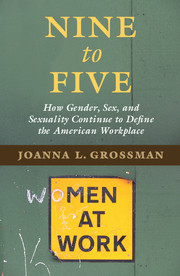Book contents
- Frontmatter
- Dedication
- Contents
- Foreword
- Acknowledgments
- Introduction
- PART I WHAT IS SEX DISCRIMINATION?
- PART II SEXUAL HARASSMENT
- PART III PREGNANT WOMEN AND MOTHERS AT WORK
- 31 Pregnant Truckers and the Problem of Light-Duty Assignments
- 32 A Big Win for Pregnant Police Officers
- 33 Undue Burden
- 34 Hard Labor: New Pregnancy Discrimination Guidance from the EEOC
- 35 Forceps Delivery: The Supreme Court Narrowly Saves the Pregnancy Discrimination Act in Young vs. UPS
- 36 The Pregnancy Discrimination Act Reaches Advanced Maternal Age
- 37 The Pregnant Workers’ Fairness Act: A Time for Change?
- 38 The Supreme Court Deals a Blow to Once-Pregnant Retirees
- 39 If She Does Not Win It Is a Shame
- 40 Must Employers Who Cover Prescriptions Cover Contraception?
- 41 Fertile Ground for Discrimination
- 42 Can a Woman Be Fired for Absenteeism Related to Fertility Treatments?
- 43 Is Lactation Related to Pregnancy?
- 44 A Victory for Families, but Hardly a Panacea
- 45 A Small Step in the Right Direction: The Family and Medical Leave Act at Twenty
- 46 “Best Practices” to Promote Work-Family Balance
- PART IV FEMALE BREADWINNERS AND THE GLASS CEILING
- Conclusion
- Notes
- Index
33 - Undue Burden
from PART III - PREGNANT WOMEN AND MOTHERS AT WORK
Published online by Cambridge University Press: 05 May 2016
- Frontmatter
- Dedication
- Contents
- Foreword
- Acknowledgments
- Introduction
- PART I WHAT IS SEX DISCRIMINATION?
- PART II SEXUAL HARASSMENT
- PART III PREGNANT WOMEN AND MOTHERS AT WORK
- 31 Pregnant Truckers and the Problem of Light-Duty Assignments
- 32 A Big Win for Pregnant Police Officers
- 33 Undue Burden
- 34 Hard Labor: New Pregnancy Discrimination Guidance from the EEOC
- 35 Forceps Delivery: The Supreme Court Narrowly Saves the Pregnancy Discrimination Act in Young vs. UPS
- 36 The Pregnancy Discrimination Act Reaches Advanced Maternal Age
- 37 The Pregnant Workers’ Fairness Act: A Time for Change?
- 38 The Supreme Court Deals a Blow to Once-Pregnant Retirees
- 39 If She Does Not Win It Is a Shame
- 40 Must Employers Who Cover Prescriptions Cover Contraception?
- 41 Fertile Ground for Discrimination
- 42 Can a Woman Be Fired for Absenteeism Related to Fertility Treatments?
- 43 Is Lactation Related to Pregnancy?
- 44 A Victory for Families, but Hardly a Panacea
- 45 A Small Step in the Right Direction: The Family and Medical Leave Act at Twenty
- 46 “Best Practices” to Promote Work-Family Balance
- PART IV FEMALE BREADWINNERS AND THE GLASS CEILING
- Conclusion
- Notes
- Index
Summary
It was a case of exquisitely bad timing. Akema Thompson, an officer with the New York City Police Department, was scheduled to take the sergeant's exam on October 19, 2013. But she was also scheduled to do something else that day – give birth to a baby. Because fetuses don't take requests, Officer Thompson requested an accommodation from the city that would have allowed her to take the exam on another day in the event she needed to reschedule because of a conflict with childbirth or immediate recovery from it. Her request was denied, despite the fact that promotional exams were routinely rescheduled for other reasons.
Officer Thompson has filed a charge of discrimination against the City of New York, alleging that the testing accommodation policy, administered by the Department of Citywide Administrative Services (DCAS), was unlawful as applied to her. She claims that the denial of her request for an accommodation is invalid under federal, state, and local discrimination laws. While her case has yet to be adjudicated at any level, her situation is all too common among pregnant working women. Employers routinely deny costless accommodations that impose no hardship and that, in many cases, are made available to other workers because of circumstances or conditions that conflict with workplace obligations. Officer Thompson is just the latest victim of a system that fails to see pregnancy as a condition worthy of even minor accommodation. The consequences of this mind-set for individual women, like Officer Thompson, and women in general is devastating.
THOMPSON V. CITY OF NEW YORK: THE CHARGES
Officer Thompson is challenging the denial of a testing accommodation as a form of unlawful discrimination. Officer Thompson filed a charge with the EEOC, alleging denial of her requested accommodation constitutes sex, pregnancy, and disability discrimination. In her charge, she details the request she made and the various responses she received from DCAS. This agency regulates and administers testing for all city jobs – not just those at the NYPD. Thus, the NYPD was not responsible for the denial of Officer Thompson's request. Although the facts have not been adjudicated by an agency or court, the charge filed appends copies of the written correspondence back and forth between Officer Thompson and DCAS regarding her request.
- Type
- Chapter
- Information
- Nine to FiveHow Gender, Sex, and Sexuality Continue to Define the American Workplace, pp. 199 - 203Publisher: Cambridge University PressPrint publication year: 2016



